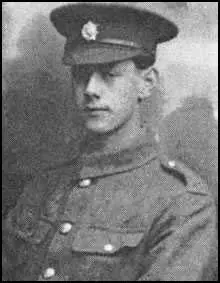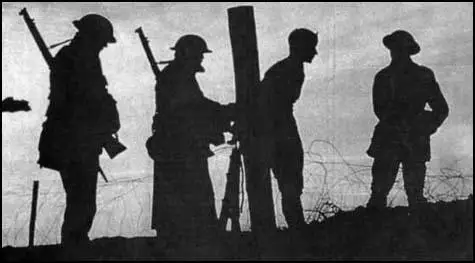Private Reginald Tite

At the beginning of the First World War Reginald Tite was living with his older brother, Joseph, and the rest of his family at Church Lane, East Grinstead. Joseph joined the army soon after war was declared but Reginald remained a civilian until October 1915. Reginald, like many young men, was appalled by the German authorities decision to shoot Edith Cavell for spying. Ten days after the execution of Cavell, Tite joined the 13th Battalion of the Royal Sussex Regiment.
Tite was quickly sent to the Western Front and during the summer of 1916, Tite took part in the offensive at the Somme. By October the British Army had lost over 400,000 men in its repeated attempts to take German held trenches in the Somme sector.
Reginald Tite survived these repeated attacks on the German lines but the loss of so many of his friends caused him a great deal of mental anguish. By 21st October 1916, Tite had been in a front-line trench for 16 days. Normally, men only served for eight days in the front-line, but when men were in short-supply, soldiers had to stay for much longer.
On 21st October the men of the 13th Battalion of the Royal Sussex Regiment were told they were to launch another attack on the German trenches. When the soldiers were given their orders to leave the trench, Tite refused to go. Tite, who was 27 years of age, was arrested and charged with cowardice. He was found guilty and executed on 25th November 1916. Soon afterwards, Reginald Tite's brother, Joseph Tite, was killed at Salonika. Reginald's two cousins, who joined with him in October 1915, were also killed during the war.

Primary Sources
(1) Private Arthur Savage was interviewed about his war experiences in 1993.
I was ordered to go on a firing squad in 1917. The man was lead out by a military policeman and a priest. Then he was tied to this post. He only looked about twenty and wasn't very tall. An officer went up to put a blindfold over his eyes. I can hear his voice now, as clear as me and you talking in this room. He said "I need no blindfold over my eyes. Curse you and your blindfold and may the judges who will surely sentence you one day show you more mercy than you've shown me."
Then we had to take aim. My hands were shaking so much. So I aimed about a foot to his left. Then we fired. There were nine of us and only one shot caught him in the side. He slumped forward wounded. So I was not the only one firing wide deliberately. The captain walked up to him and put a bullet into his head. Some of the men were sick, others were crying.
Most of the poor sods were mainly convicted on the evidence of doctors. They would not accept that men could reach a point of utter exhaustion when as a result of trench warfare their nerves and brains would snap. These so-called 'doctors' would not have it that there was such an illness as shell-shock. They insisted that men were cowards and deserters.
(2) At the age of fourteen, Victor Silvester ran away from Ardingly College and joined the army. In an interview he gave just before his death in 1978, he described how he was ordered to execute a man for desertion.
We marched to the quarry outside Staples at dawn. The victim was brought out from a shed and led struggling to a chair to which he was then bound and a white handkerchief placed over his heart as our target area. He was said to have fled in the face of the enemy.
Mortified by the sight of the poor wretch tugging at his bonds, twelve of us, on the order raised our rifles unsteadily. Some of the men, unable to face the ordeal, had got themselves drunk overnight. They could not have aimed straight if they tried, and, contrary to popular belief, all twelve rifles were loaded. The condemned man had also been plied with whisky during the night, but I remained sober through fear.
The tears were rolling down my cheeks as he went on attempting to free himself from the ropes attaching him to the chair. I aimed blindly and when the gunsmoke had cleared away we were further horrified to see that, although wounded, the intended victim was still alive. Still blindfolded, he was attempting to make a run for it still strapped to the chair. The blood was running freely from a chest wound. An officer in charge stepped forward to put the finishing touch with a revolver held to the poor man's temple. He had only once cried out and that was when he shouted the one word 'mother'. He could not have been much older than me. We were told later that he had in fact been suffering from shell-shock, a condition not recognised by the army at the time. Later I took part in four more such executions.
